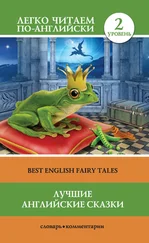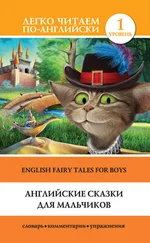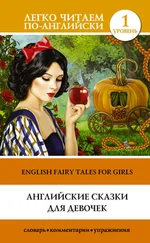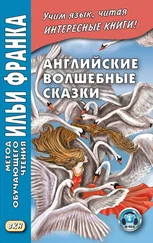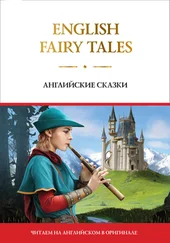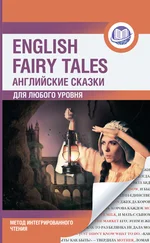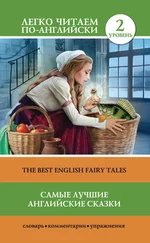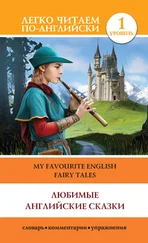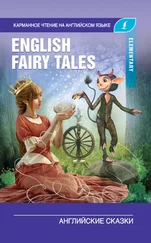Joseph Jacobs - More English Fairy Tales
Здесь есть возможность читать онлайн «Joseph Jacobs - More English Fairy Tales» весь текст электронной книги совершенно бесплатно (целиком полную версию без сокращений). В некоторых случаях можно слушать аудио, скачать через торрент в формате fb2 и присутствует краткое содержание. Год выпуска: 1894, Жанр: Сказка, на английском языке. Описание произведения, (предисловие) а так же отзывы посетителей доступны на портале библиотеки ЛибКат.
- Название:More English Fairy Tales
- Автор:
- Жанр:
- Год:1894
- ISBN:нет данных
- Рейтинг книги:5 / 5. Голосов: 1
-
Избранное:Добавить в избранное
- Отзывы:
-
Ваша оценка:
- 100
- 1
- 2
- 3
- 4
- 5
More English Fairy Tales: краткое содержание, описание и аннотация
Предлагаем к чтению аннотацию, описание, краткое содержание или предисловие (зависит от того, что написал сам автор книги «More English Fairy Tales»). Если вы не нашли необходимую информацию о книге — напишите в комментариях, мы постараемся отыскать её.
Illustrated by John D. Batten.
Book text and illustrations are taken from the site www.gutenberg.org
More English Fairy Tales — читать онлайн бесплатно полную книгу (весь текст) целиком
Ниже представлен текст книги, разбитый по страницам. Система сохранения места последней прочитанной страницы, позволяет с удобством читать онлайн бесплатно книгу «More English Fairy Tales», без необходимости каждый раз заново искать на чём Вы остановились. Поставьте закладку, и сможете в любой момент перейти на страницу, на которой закончили чтение.
Интервал:
Закладка:
And so it was, the men fell to disputing which had suffered the most by her, and when the master came up all would be heard at once and none listened to him, and it came to blows all round, and the first they knew they had shoved one another into the pond.
When the girl thought they had had enough she took the spell off, and the master asked her what had begun the row, for he had not heard in the confusion.
And the girl said: “They were ready to fall on any one; they’d have beat me if you had not come by.”
So it blew over for that time, and through her feathers she made the best laundress ever known. But to make a long story short, when the seven years and a day were up, the bird-husband, who had known her doings all along, came after her, restored to his own shape again. And he told her mistress he had come to take her from being a servant, and that she should have servants under her. But he did not tell of the feathers.
And then he bade her give the men back their savings.
“That was a rare game you had with them,” said he, “but now you are going where there is plenty, leave them each their own.” So she did; and they drove off to their castle, where they lived happy ever after.
Sir Gammer Vans
Last Sunday morning at six o’clock in the evening as I was sailing over the tops of the mountains in my little boat, I met two men on horseback riding on one mare: So I asked them, “Could they tell me whether the little old woman was dead yet who was hanged last Saturday week for drowning herself in a shower of feathers?” They said they could not positively inform me, but if I went to Sir Gammer Vans he could tell me all about it. “But how am I to know the house?” said I. “Ho, ’t is easy enough,” said they, “for ’t is a brick house, built entirely of flints, standing alone by itself in the middle of sixty or seventy others just like it.”
“Oh, nothing in the world is easier,” said I.
“Nothing can be easier,” said they: so I went on my way.
Now this Sir G. Vans was a giant, and a bottle-maker. And as all giants who are bottle-makers usually pop out of a little thumb-bottle from behind the door, so did Sir G. Vans.
“How d’ye do?” says he.
“Very well, I thank you,” says I.
“Have some breakfast with me?”
“With all my heart,” says I.
So he gave me a slice of beer, and a cup of cold veal; and there was a little dog under the table that picked up all the crumbs.
“Hang him,” says I.
“No, don’t hang him,” says he; “for he killed a hare yesterday. And if you don’t believe me, I’ll show you the hare alive in a basket.”
So he took me into his garden to show me the curiosities. In one corner there was a fox hatching eagle’s eggs; in another there was an iron apple tree, entirely covered with pears and lead; in the third there was the hare which the dog killed yesterday alive in the basket; and in the fourth there were twenty-four hipper switches threshing tobacco, and at the sight of me they threshed so hard that they drove the plug through the wall, and through a little dog that was passing by on the other side. I, hearing the dog howl, jumped over the wall; and turned it as neatly inside out as possible, when it ran away as if it had not an hour to live. Then he took me into the park to show me his deer: and I remembered that I had a warrant in my pocket to shoot venison for his majesty’s dinner. So I set fire to my bow, poised my arrow, and shot amongst them. I broke seventeen ribs on one side, and twenty-one and a half on the other; but my arrow passed clean through without ever touching it, and the worst was I lost my arrow: however, I found it again in the hollow of a tree. I felt it; it felt clammy. I smelt it; it smelt honey. “Oh, ho,” said I, “here’s a bee’s nest,” when out sprang a covey of partridges. I shot at them; some say I killed eighteen; but I am sure I killed thirty-six, besides a dead salmon which was flying over the bridge, of which I made the best apple-pie I ever tasted.
Tom Hickathrift
Before the days of William the Conqueror there dwelt a man in the marsh of the Isle of Ely whose name was Thomas Hickathrift, a poor day labourer, but so stout that he could do two days’ work in one. His one son he called by his own name, Thomas Hickathrift, and he put him to good learning, but the lad was none of the wisest, and indeed seemed to be somewhat soft, so he got no good at all from his teaching.
Tom’s father died, and his mother being tender of him, kept him as well as she could. The slothful fellow would do nothing but sit in the chimney-corner, and eat as much at a time as would serve four or five ordinary men. And so much did he grow that when but ten years old he was already eight feet high, and his hand like a shoulder of mutton.
One day his mother went to a rich farmer’s house to beg a bottle of straw for herself and Tom. “Take what you will,” said the farmer, an honest charitable man. So when she got home she told Tom to fetch the straw, but he wouldn’t and, beg as she might, he wouldn’t till she borrowed him a cart rope. So off he went, and when he came to the farmer’s, master and men were all a-trashing in the barn.
“I’m come for the straw,” said Tom.
“Take as much as thou canst carry,” said the farmer.
So Tom laid down his rope and began to make his bottle.
“Your rope is too short,” said the farmer by way of a joke; but the joke was on Tom’s side, for when he had made up his load there was some twenty hundred-weight of straw, and though they called him a fool for thinking he could carry the tithe of it, he flung it over his shoulder as if it had been a hundred-weight, to the great admiration of master and men.
Tom’s strength being thus made known there was no longer any basking by the fire for him; every one would be hiring him to work, and telling him ’t was a shame to live such a lazy life. So Tom seeing them wait on him as they did, went to work first with one, then with another. And one day a woodman desired his help to bring home a tree. Off went Tom and four men besides, and when they came to the tree they began to draw it into the cart with pulleys. At last Tom, seeing them unable to lift it, “Stand away, you fools,” said he, and taking the tree, set it on one end and laid it in the cart. “Now,” said he, “see what a man can do.” “Marry, ’t is true,” said they, and the woodman asked what reward he’d take. “Oh, a stick for my mother’s fire,” said Tom; and espying a tree bigger than was in the cart, he laid it on his shoulders and went home with it as fast as the cart and six horses could draw it.
Tom now saw that he had more strength than twenty men, and began to be very merry, taking delight in company, in going to fairs and meetings, in seeing sports and pastimes. And at cudgels, wrestling, or throwing the hammer, not a man could stand against him, so that at last none durst go into the ring to wrestle with him, and his fame was spread more and more in the country.
Far and near he would go to any meetings, as football play or the like. And one day in a part of the country where he was a stranger, and none knew him, he stopped to watch the company at football play; rare sport it was; but Tom spoiled it all, for meeting the ball he took it such a kick that away it flew none could tell whither. They were angry with Tom as you may fancy, but got nothing by that as Tom took hold of a big spar, and laid about with a will, so that though the whole country-side was up in arms against him, he cleared his way wherever he came.
It was late in the evening ere he could turn homeward, and on the road there met him four lusty rogues that had been robbing passengers all day. They thought they had a good prize in Tom, who was all alone, and made cocksure of his money.
Читать дальшеИнтервал:
Закладка:
Похожие книги на «More English Fairy Tales»
Представляем Вашему вниманию похожие книги на «More English Fairy Tales» списком для выбора. Мы отобрали схожую по названию и смыслу литературу в надежде предоставить читателям больше вариантов отыскать новые, интересные, ещё непрочитанные произведения.
Обсуждение, отзывы о книге «More English Fairy Tales» и просто собственные мнения читателей. Оставьте ваши комментарии, напишите, что Вы думаете о произведении, его смысле или главных героях. Укажите что конкретно понравилось, а что нет, и почему Вы так считаете.

